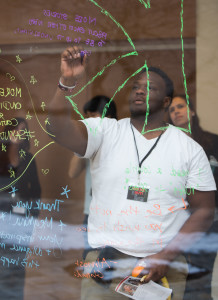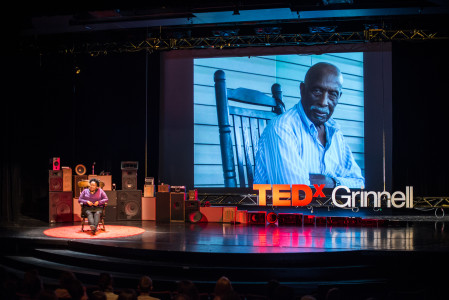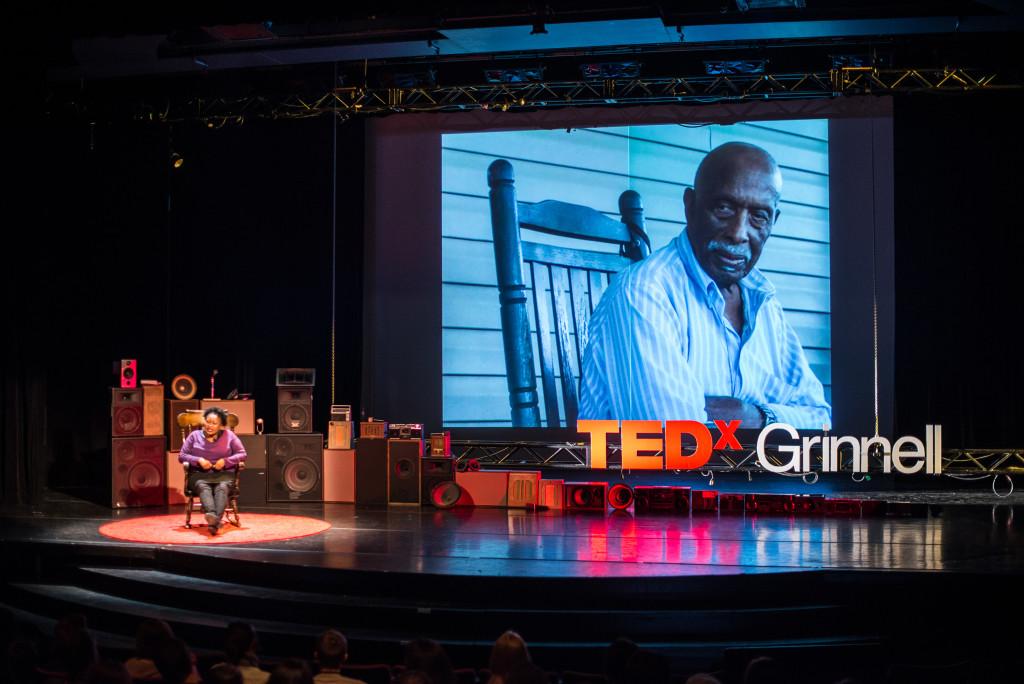Over the weekend of Feb. 21-22, seven Grinnell College alumni returned to campus to “Speak Out” at the College’s first ever TEDxGrinnell event. The presentation series brought together a group of talented storytellers who shared their personal and professional stories in Roberts Theatre on Saturday and with the world via live stream online.
The alumni brought multiple perspectives on the topic inspired by Wadzi Motsi ’12 who spoke in her talk, “Do Something that Scares You,” about her life-changing experience as a Watson Fellow. Motsi spent her trip studying the motivations behind youth political activism, and she said that the experience challenged her in unexpected ways.

Photo by John Brady.
“Nothing prepares you for the Watson,” Motsi said. “This in particular is really important because a lot of students come to Grinnell with push to grow, but then you settle in a comfort zone, a liberal comfort zone and you’re not really willing to put yourself in situations where you’re really uncomfortable or with people who think really differently than you. … My talk is really trying to help people push that boundary and really challenge themselves and put themselves in unfamiliar spaces so they can learn and grow.”
Motsi was not the only speaker to address personal growth after graduating from Grinnell. Tarell “Ahmed” Rodgers ’93 encouraged students to find love for themselves in his talk “A Look in the Mirror,” in which he told the story of his discovery of his sense of self after spending time in prison. Rodgers called for students to think beyond academia during their college years and develop themselves internally as well.
“I would love for you all … [to] gain all the knowledge you can, but develop yourself as a person,” Rodgers said. “Let’s figure out a way for students to figure out who they are and define themselves, but from an inner perspective versus an academic.”
Lester Alemán ’07 also discussed the acceptance of self during his presentation on “Accepting Diversity.” The former Posse scholar, Posse trainer and Posse Los Angeles program director spoke out on breaking down internalized stereotypes of race and expanding representation of different races.
“We haven’t accepted our own diversity in this country, and that’s a problem,” Alemán explained during his story. “America’s changing and so must we.”
Other alumni spoke on career exploration and creative pursuits including Zander Cannon ’95’s presentation, “How to be an Unprofessional Artist.” Cannon discussed the difficulty of maintaining a creative profession, producing work you’re passionate about and achieving financial stability.

Photo by John Brady.
“Being a professional creative person … everyone tells you not to do it and they’re not wrong. They’re saying you should have a job that’s more reliable, that pays better, that you can rely on. And if you wouldn’t be absolutely miserable doing it, that may be good advice,” Cannon said.
In his story onstage, Cannon spoke of his journey to creating the popular graphic novel, “Heck,” and encouraged listeners to find honesty and individuality in their creative work.
“Everyone wants a little bit of honesty, and as it turns out no one wants something that is just on time, under budget and exactly what was asked for. No one wants something where all it is, is professional,” Cannon explained during his TEDx talk.
April Dobbins ’99 also explored finding one’s place in creative work in her story, “Home is Where the Heart of the Story is.”
“I grew up in rural Alabama, and the whole time living there, I really felt like it was nowhere, it was nothing, I was no one because I grew up there. I kind of envied people who lived in cities, and I felt like if I wanted to be someone I had to live in a city, there were no stories in Alabama,” Dobbins said.
After returning to her grandfather’s farm as an adult, however, Dobbins saw the importance of connecting with her roots.
“I started out in this place thinking that it was nowhere. I went out and found all these other stories, but then when I came back I found out that that was the story I was supposed to be telling all along,” Dobbins said.
Following speakers stayed true to the theme of “Speak Out” with stories of how voices are formed and manipulated. Grinnell Professor Emma Kelty-Stephen ’04, Psychology, presented findings of her work with the formation of language in children in “What Do Children Need?” During her talk, Kelty-Stephen stressed the importance of talking to children from a very young age.
“People don’t always realize that really young children are getting a lot out of language. … Children are really getting a lot from input early on,” she said.
This input is crucial and important for everyone to do for children, Kelty-Stephen argued.
“This is not something you can buy for a child. This is something anyone can do,” Kelty-Stephen said during her TEDx talk.
Joshua Tepfer ’97 has devoted most of his career to freeing those whom he believes have been wrongfully accused. During his talk, “Why Would a Kid Falsely Confess to a Crime?” he discussed the criminal justice system and why children confess to crimes they did not commit, and what happens to children when their words are manipulated by adults.
“People generally don’t understand how someone could admit to a serious crime that they didn’t commit,” Tepfer said. “But it actually is common and it happens a lot and there’s a lot of reasons that kids in particular are very vulnerable to doing it, and it has a lot to do with the way police investigate cases and question kids about crimes.”
During his TEDx Talk, Tepfer showed the audience these investigation tactics and called on listeners to think more about how they see stories, particularly those of confessions, presented in the media.
“Allow yourself the benefit of some skepticism,” Tepfer said in closing during his talk.
These speakers were a hit among attendees, with many audience members striking up conversations with presenters during the extended breaks in the program. The audience was also encouraged to speak out by writing on the windows of Bucksbaum with provided markers.
After the event, Milton Garcia ’14, a Post Baccalaureate Intercultural Assistant, spoke about what it meant to him to have a TED event at the College.
“I thought it was phenomenal,” Garcia said. “Because it’s one of the first happening here at Grinnell, it leaves you a little bit speechless that your little school in rural Iowa would be able to do such a phenomenal [conference] … You’re part of that bigger thing.”





























































